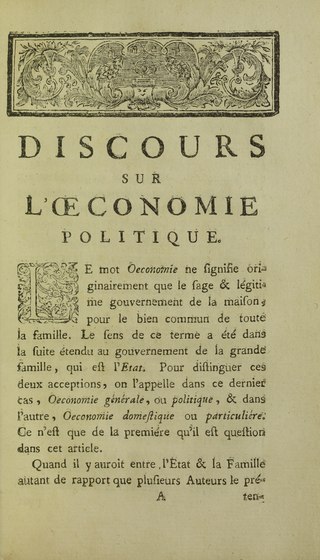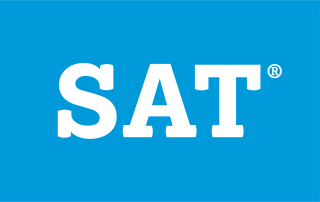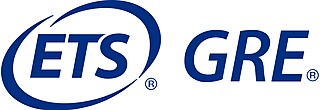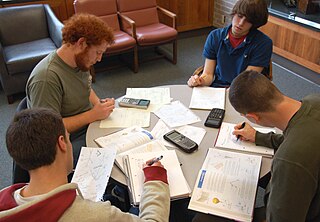
Political economy is a branch of political science and economics studying economic systems and their governance by political systems. Widely studied phenomena within the discipline are systems such as labour markets and financial markets, as well as phenomena such as growth, distribution, inequality, and trade, and how these are shaped by institutions, laws, and government policy. Originating in the 16th century, it is the precursor to the modern discipline of economics. Political economy in its modern form is considered an interdisciplinary field, drawing on theory from both political science and modern economics.

Robert Emerson Lucas Jr. was an American economist at the University of Chicago. Widely regarded as the central figure in the development of the new classical approach to macroeconomics, he received the Nobel Prize in Economics in 1995 "for having developed and applied the hypothesis of rational expectations, and thereby having transformed macroeconomic analysis and deepened our understanding of economic policy". He was characterized by N. Gregory Mankiw as "the most influential macroeconomist of the last quarter of the 20th century". In 2020, he ranked as the 10th most cited economist in the world.

In the United States, education is provided in public and private schools and by individuals through homeschooling. State governments set overall educational standards, often mandate standardized tests for K–12 public school systems and supervise, usually through a board of regents, state colleges, and universities. The bulk of the $1.3 trillion in funding comes from state and local governments, with federal funding accounting for about $260 billion in 2021 compared to around $200 billion in past years.

The SAT is a standardized test widely used for college admissions in the United States. Since its debut in 1926, its name and scoring have changed several times. For much of its history, it was called the Scholastic Aptitude Test and had two components, Verbal and Mathematical, each of which was scored on a range from 200 to 800. Later it was called the Scholastic Assessment Test, then the SAT I: Reasoning Test, then the SAT Reasoning Test, then simply the SAT.

Standardized test is a test that is administered and scored in a consistent, or "standard", manner. Standardized tests are designed in such a way that the questions and interpretations are consistent and are administered and scored in a predetermined, standard manner.

The Graduate Record Examinations (GRE) is a standardized test that is part of the admissions process for many graduate schools in the United States and Canada and a few other countries. The GRE is owned and administered by Educational Testing Service (ETS). The test was established in 1936 by the Carnegie Foundation for the Advancement of Teaching.

Educational Testing Service (ETS), founded in 1947, is the world's largest private educational testing and assessment organization. It is headquartered in Lawrence Township, New Jersey, but has a Princeton address.
The GRE subject test in mathematics is a standardized test in the United States created by the Educational Testing Service (ETS), and is designed to assess a candidate's potential for graduate or post-graduate study in the field of mathematics. It contains questions from many fields of mathematics; about 50% of the questions come from calculus, 25% come from algebra, and 25% come from a broad variety of other topics typically encountered in undergraduate mathematics courses, such as point-set topology, probability and statistics, geometry, and real analysis.

John August List is an American economist known for his work in establishing field experiments as a tool in empirical economic analysis. Since 2016, he has served as the Kenneth C. Griffin Distinguished Service Professor of Economics at the University of Chicago, where he was Chairman of the Department of Economics from 2012 to 2018. Since 2016, he has also served as Visiting Robert F. Hartsook Chair in Fundraising at the Lilly Family School of Philanthropy at Indiana University.

Edward Paul Lazear was an American economist, the Morris Arnold and Nona Jean Cox Senior Fellow at the Hoover Institution at Stanford University and the Davies Family Professor of Economics at Stanford Graduate School of Business.
The GRE Literature in English Test was a standardized test administered by the Educational Testing Service. It was intended to evaluate applicants seeking admission to a graduate program in English Studies. The test surveyed a wide range of topics related to literature in English, but the focus was mainly on works long accepted as part of the canon.

American International University-Bangladesh, commonly known by its acronym AIUB, is a private university in Dhaka, Bangladesh. This university was established in 1994 in the capital Dhaka of Bangladesh. It offers several degree programs at the undergraduate and graduate levels from its four faculties. The university is an independent organization with its own board of trustees.

Susan Carleton Athey is an American economist. She is the Economics of Technology Professor in the School of Humanities and Sciences at the Stanford Graduate School of Business. Prior to joining Stanford, she has been a professor at Harvard University and the Massachusetts Institute of Technology. She is the first female winner of the John Bates Clark Medal. She served as the consulting chief economist for Microsoft for six years and was a consulting researcher to Microsoft Research. She is currently on the boards of Expedia, Lending Club, Rover, Turo, Ripple, and non-profit Innovations for Poverty Action. She also serves as the senior fellow at Stanford Institute for Economic Policy Research. She is an associate director for the Stanford Institute for Human-Centered Artificial Intelligence and the director of Golub Capital Social Impact Lab.

Alvin Eliot Roth is an American academic. He is the Craig and Susan McCaw professor of economics at Stanford University and the Gund professor of economics and business administration emeritus at Harvard University. He was President of the American Economic Association in 2017.

TRIUM Global Executive MBA program is an alliance between NYU Stern School of Business, London School of Economics and Political Science (LSE), and HEC School of Management, Paris. TRIUM is ranked #2 in the world in the 2018 Financial Times EMBA rankings and #1 in the 2014 edition. It has also been ranked #1 in the world in the QS Global Joint Executive MBA Rankings every year for the past four years.

Test preparation or exam preparation is an educational course, tutoring service, educational material, or a learning tool designed to increase students' performance on standardized tests. Examples of these tests include entrance examinations used for admissions to institutions of higher education, such as college, business school, law school, medical school, BMAT, UKCAT and GAMSAT and graduate school and qualifying examinations for admission to gifted education programs.
Parag A. Pathak is Professor of Economics at the Massachusetts Institute of Technology and is affiliated with the National Bureau of Economic Research where he co-founded and directs the working group on market design.
The GRE subject test in chemistry is a standardized test in the United States created by the Educational Testing Service, and is designed to assess a candidate's potential for graduate or post-graduate study in the field of chemistry. It contains questions from many fields of chemistry. 15% of the questions will come from analytical chemistry, 25% will come from inorganic chemistry, 30% will come from organic chemistry and 30% will come from physical chemistry.
The GRE subject test in biology was a standardized test in the United States created by the Educational Testing Service, and is designed to assess a candidate's potential for graduate or post-graduate study in the field of biology. The test is comprehensive and covers—in equal proportions—molecular biology, organismal biology, and ecology and evolution.














